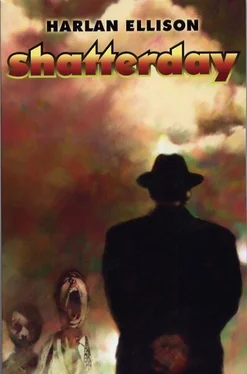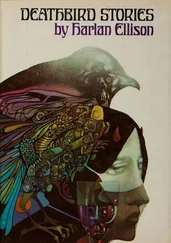My conscience was clear about what happened to Charlotte, but no one escapes that kind of relationship without feeling some vestigial guilt, deserved or not.
I had mentioned the affair indirectly in one or another story through the years, but I’d never used it as a major element in my fiction. This time I’d been brave, I’d gone down the steps, through the cavern to the cell, and held the dim light up to the barred window for longer than ever before. It had shaken me, but I’d thought I was really courageous in doing it.
Now here was Vicky Haider asking me to go down there and open the door and stare for a long time at the horrible memories chained to the wall. Without any indication save her remarkable instincts as an editor, she had struck directly to the flaming core of the torment in the story. What she was asking me to do was more terrifying than suggestions of diving into a tank of hammerhead sharks. She wanted me to confront one of the most deeply hidden secrets of my life.
How could she have known?
She was an editor, in the noblest, most innovative sense of that word. She was not one of the parvenus who wind up behind desks and call themselves editors; she was an editor. She understood story, understood that it is only when a writer comes to grips with the darkest fears and mortal dreads in his caverns of memory that dangerous, meaningful fiction is produced.
I swallowed hard and told her I’d see what I could do.
Though it had taken years to get the story written, once I’d begun the actual writing it had gone swiftly, only a few full days of unceasing labor.
It took me two months to produce the ten paragraphs she needed, the mere two pages of additional copy that would encapsulate with one incident the four year hell through which Charlotte and I had toiled.
How do you sum it up? What one escapade foreshadows and memorializes all the cumulative ghastliness that ends in divorce and madness? Relationships aren’t like that. They don’t have clear-cut melodramatic parameters. They’re amalgams of a million isolated, minuscule slights, affronts, cruelties and brutalities.
Two months. It took me two months, but I finally did it, and it left me sweating and cold. I sent her the pages and she said, “Yes, this is what was missing.” Yes, it was. The soul of darkness.
This story is one of my best, I now think. It is certainly one of my most painful. And I owe it all to Victoria Chen Haider. I’m glad I got to tell her that.
On May 25, 1979, Vicky Haider died in the O’Hare Airport crash of an American Airlines DC-10. She was on her way to the American Booksellers Association convention here in Los Angeles. We had planned to meet for the first time.
I never talked to Vicky Haider face-to-face, and now she is gone; and as a writer who once tasted the wonder of working with an exceptional editor who knew more about what I was doing than even I knew, my sense of loss is beyond the telling.
When you’re alone, as a writer is alone, locked in single combat with the imagination, allies are rare and special.
Those who understand are even rarer.
This story is as much Vicky Haider’s as it is mine.
And all of us are the poorer because she will never again work her editorial magic.
He turned onto his left side in the bed, trying to avoid the wet spot. He propped his hand against his cheek, smiled grimly, and prepared himself to tell her the truth about why he had been married and divorced three times.
“Three times!” she had said, her eyes widening, that familiar line of perplexity appearing vertically between her brows. “Three times. Christ, in all the time we went together, I never knew that. Three, huh?”
Michael Kirxby tightened the grim smile slightly. “You never asked, so I never mentioned it,” he said. “There’s a lot of things I never bother to mention: I flunked French in high school and had to work and go to summer school so I could graduate a semester late; I once worked as a short-order cook in a diner in New Jersey near the Turnpike; I’ve had the clap maybe half a dozen times and the crabs twice…”
“Ichhh, don’t talk about it!” She buried her naked face in the pillow. He reached out and ran his hand up under her thick, chestnut hair, ran it all the way up to the occipital ridge and massaged the cleft. She came up from where she had hidden.
That had been a few moments ago. Now he propped himself on his bent arm and proceeded to tell her the truth about it. He never lied; it simply wasn’t worth the trouble. But it was a long story, and he’d told it a million times; and even though he had developed a storyteller’s facility with the interminable history of it, he had learned to sketch in whole sections with apocryphal sentences, had developed the use of artful time-lapse jumps. Still, it took a good fifteen minutes to do it right, to achieve the proper reaction and, quite frankly, he was bored with the recitation. But there were occasions when it served its purpose, and this was one of them, so he launched into it.
“I got married the first time when I was twenty, twenty-one, something like that. I’m lousy on dates. Anyhow, she was a sick girl, disturbed before I ever met her; family thing, hated her mother, loved her father—he was an ex-Marine, big, good-looking—secretly wanted to ball the old man but never could cop to it. He died of cancer of the brain but before he went, he began acting erratically, treating the mother like shit. Not that the mother didn’t deserve it… she was a harridan, a real termagant. But it was really outrageous, he wasn’t coming home nights, beating up the mother, that sort of thing. So my wife sided with the mother against him. When they found out his brain was being eaten up by the tumor, she flipped and went off the deep end. Made my life a furnace! After I divorced her, the mother had her committed. She’s been in the asylum over seventeen years now. For me, it was close; too damned close. She very nearly took me with her to the madhouse. I got away just in time. A little longer, I wouldn’t be here today.”
He watched her face. Martha was listening closely now. Heartmeat information. This was the sort of thing they loved to hear; the fiber material, the formative chunks, something they could sink their neat, small teeth into. He sat up, reached over and clicked on the bed lamp. The light was on his right side as he stared toward the foot of the bed, apparently conjuring up the painful past; the light limned his profile. He had a Dick Tracy chin and deep-set brown eyes. He cut his own hair, did it badly, and it shagged over his ears as though he had just crawled out of bed. Fortunately, it was wavy and he was in bed: he knew the light and the profile were good. Particularly for the story.
“I was in crap shape after her. Almost went down the tube. She came within a finger of pulling me onto the shock table with her. She always, always had the hoodoo sign on me; I had very little defense against her. Really scares me when I think about it.”
The naked Martha looked at him. “Mike… what was her name?”
He swallowed hard. Even now, years later, after it was ended he found himself unable to cleanse the memories of pain and fear. “Her name was Cindy.”
“Well, uh, what did she do that was so awful?”
He thought about it for a second. This was a departure from the routine. He wasn’t usually asked for further specifics. And running back through the memories he found most of them had blurred into one indistinguishable throb of misery. There were incidents he remembered, incidents so heavily freighted with anguish that he could feel his gorge becoming buoyant, but they were part of the whole terrible time with Cindy, and trying to pick them out so they would convey, in microcosm, the shrieking hell of their marriage, was like retelling something funny from the day before, to people who had not been there. Not funny. Oh, well, you’d have to be there.
Читать дальше












